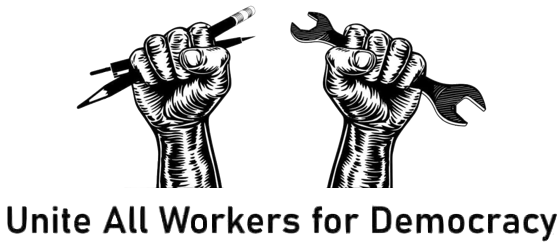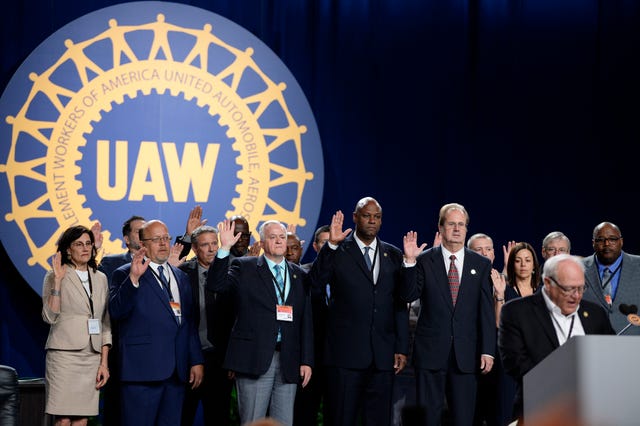***(Important note) If you have not received a ballot and believe you are eligible to vote in the Referendum, please contact the election vendor directly at [email protected] or 855-433-8683 as soon as possible to request one. In order to have a vote counted, each member must assure that they are in good standing as of November 19, 2021. All returned ballots must be received through the mail by the designated U.S. Post Office to be picked up by the independent election vendor by no later than Monday, November 29, 2021, at 10 a.m. ET.***
As we quickly approach the deadline in which the election vendor must receive UAW members’ ballots for the referendum vote, one of the more interesting propositions of the debate that has surrounded this historic moment has been the idea of simply fixing the convention delegate system. Advocates of our current system often suggest that we don’t need to be so drastic as to completely change the process in which we elect our International Executive Board (IEB) officers. They suggest that there’s no need to “throw the baby out with the bathwater.” Instead, they believe that the current system needs only to be tweaked and fine tuned around the edges to make it a more fair and democratic process.
What most advocates of this proposal fail to address — or even acknowledge — is the most monumental problem facing the UAW; the fact that a single political party within our union — the Administration Caucus (AC) — controls every aspect of our organization at the International level and has done so with impunity for decades. This includes our UAW conventions, where the AC has various ways to manipulate the convention delegate system to produce the results they want to see. And they do so with stunning efficiency. That tends to be what happens when one party spends decades in power and is able to refine their methods to ensure they remain in control.
Wrote New York Times reporter John Holusha in 1988:
“The U.A.W is a curious institution politically. At the local level, it is a vigorous democracy, with contracts requiring a majority of rank-and-file votes for ratification. Local leaders are elected from the ranks and the turnover in some locals is brisk. Coalitions form and disband within plants and across regions. But the national leadership – the president, secretary-treasurer, vice presidents and regional directors – has a different arrangement. Solidarity House, the national headquarters, controls favors and finances like an old-style big-city political machine, and the national leadership is shielded by a convention system of election. Its governing body has dominated every convention since Mr. (Walter) Reuther consolidated his power in the late 1940’s.”
Due to one party rule, the delegate system has been rendered completely ineffective in fostering any sort of genuine democracy in the upper echelons of our union. In truth, the exact opposite has occurred. Over the years, the delegate system has worked to further entrench the AC into every facet of the UAW. At our conventions, the AC controls who sits on vital convention committees, presides over the proceedings, sets the agenda, controls which resolutions make it to the convention floor for debate, etc. They control every aspect of convention activities. They control all of the processes outside of the convention as well — who receives an appointed job, where union funds are allocated, collective bargaining strategy, joint programs and joint funds, etc.
You can probably see why this environment would not be conducive to ensuring democracy and serving the best interests of the membership. For decades, it has instead worked to serve the best interests of the AC. Yet, according to many advocates of the delegate election system, there’s a level playing field for candidates running for IEB office. The Admin Caucus routinely wins IEB elections by over 95% time and time again simply because their ideas and credentials are just that much better than everyone else’s.
Unfortunately, the events over the last forty years tell a vastly different story.
Other than Jerry Tucker — who somehow managed to defy the odds in 1988 — no one outside of the AC has sat on the IEB over the last seven decades. And even in the case of Tucker, the AC attempted to steal the Region 5 election from him in 1986. The Department of Labor investigated and eventually mandated that a new Region 5 election be held, which Tucker won in 1988. The AC spent the next year doing everything in its power to sabotage Tucker’s time as director and to ensure he would not win re-election in 1989.
The AC has retained complete control over our union for so long, in the eyes of many UAW members, the Administration Caucus IS the IEB. While it is true that officers on the IEB over the years have long been members of the AC, the AC is not indistinguishable from the IEB. They are not one and the same. AC members may be elected by delegates to occupy the top positions of our union, but the AC doesn’t own the IEB, just as no officer at any level of the UAW has a divine right to any position of leadership.
Unfortunately, the referendum vote doesn’t address the crucial role delegates will continue to fulfill in every other aspect of our convention proceedings — which means the AC will still have plenty of ways to control outcomes of policy, strategy, etc. I believe the role of delegates is an extremely important and worthwhile debate we must have down the road. But direct elections would immediately work to decentralize the AC’s ability to continually dominate the International Executive Board — it’s obviously much harder to wrangle 1,000,000 UAW members all across North America than 956 delegates*** gathered at a convention at Cobo Hall in Detroit.
***(As an aside, at the 2018 UAW Constitutional Convention 956 delegates reported for the roll call. That means less than 1,000 members of our union decided the future direction of the UAW and elected the officers who would lead us there. I believe that may bear repeating; less than 1,000 members represented the interests of 1,000,000 UAW members. This fact alone should probably be enough to end the debate about which of the two referendum options is more democratic. Even in a worst-case doomsday scenario under a direct election system, well over 1,000 UAW members would be taking part in the process. As an example, close to 200,000 UAW members have voted and sent their referendum ballots back to the election vendor.)***
When delegate system advocates who know better refuse to acknowledge the one-party dictatorship in our union, they are perpetrating a disservice to our membership — a membership which deserves to know the full truth in order to make an educated and informed decision on this historic referendum.

